

Carnegie Institution. Un article de Wikipédia, l'encyclopédie libre.
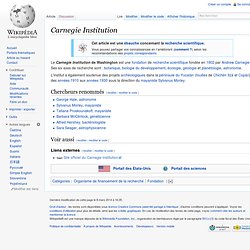
L'institut a également soutenue des projets archéologiques dans la péninsule du Yucatán (fouilles de Chichén Itzá et Copán) des années 1910 aux années 1930 sous la direction du mayaniste Sylvanus Morley. Fondation Carnegie pour la paix internationale. Un article de Wikipédia, l'encyclopédie libre.
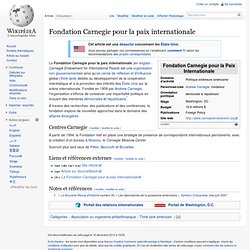
À travers des recherches, des publications et des conférences, la fondation explore de nouvelles approches dans le domaine des affaires étrangères. Centres Carnegie[modifier | modifier le code] À partir de 1994, la Fondation met en place une stratégie de présence de correspondants internationaux permanents, avec la création d'un bureau à Moscou, le Carnegie Moscow Center. Suivront plus tard ceux de Pékin, Beyrouth et Bruxelles. Liens et références externes[modifier | modifier le code] Carnegie Endowment for International Peace. The Carnegie Endowment for International Peace (CEIP) is a private nonprofit organization founded in 1910.
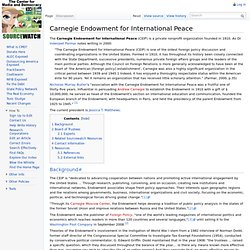
As Dr Inderjeet Parmar notes writing in 2000: "The Carnegie Endowment for International Peace (CEIP) is one of the oldest foreign policy discussion and coordinating organizations in the United States. Formed in 1910, it has throughout its history been closely connected with the State Department, successive presidents, numerous private foreign affairs groups and the leaders of the main political parties. Although the Council on Foreign Relations is more generally acknowledged to have been at the heart of ‘the American [foreign policy] establishment’, Carnegie was also a highly significant organization in the critical period between 1939 and 1945.1 Indeed, it has enjoyed a thoroughly respectable status within the American élite for 90 years.
Yet it remains an organization that has received little scholarly attention. " The current president is Jessica T. Background Board of Trustees. Heritage Foundation. Un article de Wikipédia, l'encyclopédie libre.
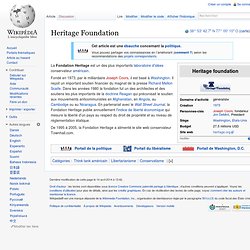
La Fondation Heritage est un des plus importants laboratoire d'idées conservateur américain. De 1995 à 2005, la Fondation Heritage a alimenté le site web conservateur Townhall.com. Heritage Foundation. Founded in 1973, The Heritage Foundation is a New Right think tank.
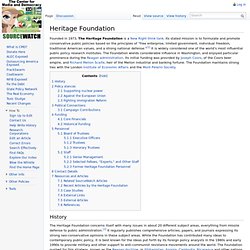
Its stated mission is to formulate and promote conservative public policies based on the principles of "free enterprise, limited government, individual freedom, traditional American values, and a strong national defense. "[1] It is widely considered one of the world's most influential public policy research institutes. Ford Foundation. Ford Foundation. The Ford Foundation was founded in 1936 by Edsel Ford and two Ford Motor Company executives.[1] Mission For more than a century, the "Ford Foundation is a resource for innovative people and institutions worldwide.
" The Foundation's stated goals are to: Strengthen democratic valuesReduce poverty and injusticePromote international cooperationAdvance human achievement. Rhodes Scholarship. Rhodes Scholars may study any full-time postgraduate course offered by the university,[7] whether a taught master's programme, a research degree, or a second undergraduate degree (senior status).
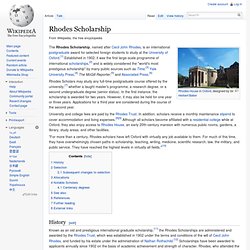
In the first instance, the scholarship is awarded for two years. However, it may also be held for one year or three years. Applications for a third year are considered during the course of the second year. University and college fees are paid by the Rhodes Trust. Cecil Rhodes. Historian Richard A.
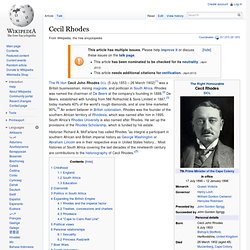
McFarlane has called Rhodes "as integral a participant in southern African and British imperial history as George Washington or Abraham Lincoln are in their respective eras in United States history... Most histories of South Africa covering the last decades of the nineteenth century are contributions to the historiography of Cecil Rhodes. De Beers. The company was founded in 1888 by Cecil Rhodes, who was financed by South African diamond magnate Alfred Beit and the London-based N M Rothschild & Sons bank.[3] In 1927, Ernest Oppenheimer, a German immigrant to Britain who had earlier founded mining giant Anglo American plc with American financier J.P.
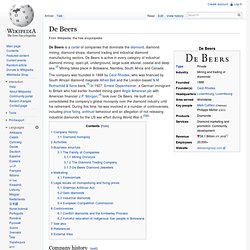
Morgan,[4] took over De Beers. He built and consolidated the company's global monopoly over the diamond industry until his retirement. During this time, he was involved in a number of controversies, including price fixing, antitrust behaviour and an allegation of not releasing industrial diamonds for the US war effort during World War II.[5][6] Company history[edit] N M Rothschild & Sons. N M Rothschild & Sons Limited, commonly referred to as Rothschild, is a British multinational investment banking company, controlled by the Rothschild family.
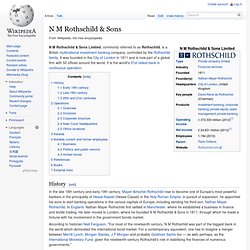
It was founded in the City of London in 1811 and is now part of a global firm with 50 offices around the world. It is the world's 31st oldest bank in continuous operation. History[edit] In the late 18th century and early 19th century, Mayer Amschel Rothschild rose to become one of Europe's most powerful bankers in the principality of Hesse-Kassel (Hesse-Cassel) in the Holy Roman Empire. In pursuit of expansion, he appointed his sons to start banking operations in the various capitals of Europe, including sending his third son, Nathan Mayer Rothschild, to England. According to historian Niall Ferguson, "For most of the nineteenth century, N M Rothschild was part of the biggest bank in the world which dominated the international bond market. Early 19th century[edit] Alfred Beit. Alfred Beit (15 February 1853 – 16 July 1906) was a British South African, gold and diamond magnate and a major donor and profiteer of infrastructure development in central and Southern Africa, and of university education and research in several countries, including being the "silent partner" who financed the Rhodes Scholarship.
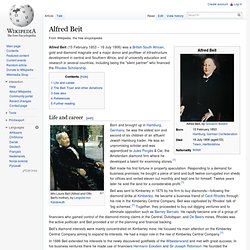
Life and career[edit] Born and brought up in Hamburg, Germany, he was the eldest son and second of six children of an affluent Jewish Hamburg trader. Center for Strategic and International Studies.